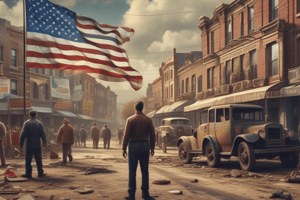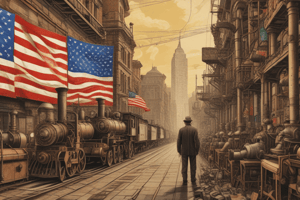Podcast
Questions and Answers
The southern states of the USA experienced a boom in industry after winning independence in 1776.
The southern states of the USA experienced a boom in industry after winning independence in 1776.
False (B)
The northern states of the USA had a strong anti-slavery movement.
The northern states of the USA had a strong anti-slavery movement.
True (A)
In the southern states, plantations required skilled workers rather than slaves.
In the southern states, plantations required skilled workers rather than slaves.
False (B)
The American Civil War was primarily caused by the North and South's disagreement over slavery and tariffs.
The American Civil War was primarily caused by the North and South's disagreement over slavery and tariffs.
All parts of the South relied on free laborers for their economic needs.
All parts of the South relied on free laborers for their economic needs.
The issue of admitting new states as free or slave-owning contributed to tensions between the North and the South.
The issue of admitting new states as free or slave-owning contributed to tensions between the North and the South.
Rubber and tea were significant plantation crops in the Southern states.
Rubber and tea were significant plantation crops in the Southern states.
The North used protective tariffs to hinder their own industry.
The North used protective tariffs to hinder their own industry.
Abraham Lincoln was elected as the 16th president of the United States in 1861.
Abraham Lincoln was elected as the 16th president of the United States in 1861.
The southern states did not form a new government after seceding from the Union.
The southern states did not form a new government after seceding from the Union.
Fort Sumter, where the initial hostilities began, was a Confederate fort.
Fort Sumter, where the initial hostilities began, was a Confederate fort.
The Emancipation Proclamation issued by Lincoln freed all slaves in the northern states.
The Emancipation Proclamation issued by Lincoln freed all slaves in the northern states.
The Battle of Gettysburg is considered a turning point in the American Civil War.
The Battle of Gettysburg is considered a turning point in the American Civil War.
The Civil War lasted for four years, ending in 1865 with the southern states submitted.
The Civil War lasted for four years, ending in 1865 with the southern states submitted.
Lincoln's Gettysburg Address emphasized the importance of equality and freedom.
Lincoln's Gettysburg Address emphasized the importance of equality and freedom.
The Reconstruction Period followed the abolition of slavery in the USA.
The Reconstruction Period followed the abolition of slavery in the USA.
The Confederates successfully captured Fort Sumter and maintained control over it.
The Confederates successfully captured Fort Sumter and maintained control over it.
The North won the Civil War, resulting in the division of the United States.
The North won the Civil War, resulting in the division of the United States.
Study Notes
Development of Northern and Southern States
- The northern states included areas north of Pennsylvania, while southern states were south of Maryland.
- Southern economy was largely agricultural, reliant on plantation crops like cotton, rubber, and tea, necessitating extensive slave labor.
- Northern states experienced an industrial revolution (1815-1860), fostering large factories, urban centers, and skilled wage-earning workers.
- The North's economy created a strong anti-slavery movement, resulting in the near abolition of slavery in those states.
Causes of the American Civil War
- Slavery: Central issue was the abolition of slavery; slaves faced harsh treatment, had no rights, and lived in fear of severe punishment.
- Taxes: Conflict regarding tariffs; northern states favored protective tariffs to support industry, while southern states opposed them due to increased costs on imports.
- Admission of New States: Controversy over whether new states like Texas and California would be free or slave-owning heightened tensions between North and South.
- Election of Abraham Lincoln: Lincoln's anti-slavery stance in 1861 led to fears among southern states, prompting 11 slave-owning states to secede from the Union and form the Confederate States of America.
Key Events in the Civil War
- Attack on Fort Sumter: Initiated hostilities in April 1861 when Confederate forces bombarded the fort, prompting Lincoln to declare war.
- Blockade: Lincoln ordered a blockade of southern ports, which restricted the Confederacy’s ability to receive supplies and weapons.
- Emancipation Proclamation: Issued by Lincoln in 1862, it freed slaves in southern states and garnered support for the Union cause.
- Battle of Gettysburg: Fought in June 1863, marked a turning point in the war with over 45,000 casualties, leading to Confederate retreat and Union victory.
Conclusion of the Civil War
- General Grant launched attacks against Confederate forces, leading to their surrender in 1865.
- Slavery was formally abolished, ensuring the preservation of the Union.
- The Civil War inflicted severe damage on the South, leading to the Reconstruction Period aimed at rebuilding and integrating the southern states into the Union.
Gettysburg Address
- Lincoln emphasized themes of freedom and equality, reinforcing the dedication to a nation conceived in liberty.
- Addressed the moral purpose of the war, linking it to a larger commitment to ensuring a government representing the people endures.
Studying That Suits You
Use AI to generate personalized quizzes and flashcards to suit your learning preferences.
Description
Explore the economic and social distinctions that emerged between the northern and southern states of the USA post-independence in 1776. The quiz delves into agricultural practices, labor systems, and the climate's influence on plantation crops. Test your knowledge on this crucial era of American history.





